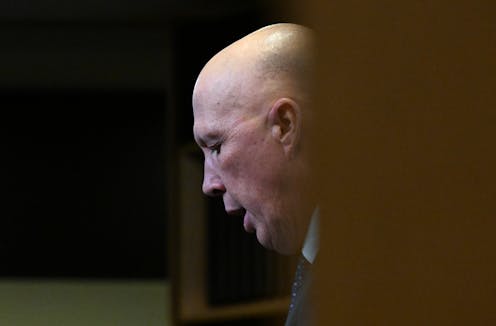Why is Peter Dutton trying to start another political fight over the school curriculum?
- Written by Stewart Riddle, Associate Professor, School of Education, University of Southern Queensland

In a move that surprised political watchers, Liberal leader Peter Dutton says the school curriculum and education reform will be some of his key priorities in opposition.
Despite the Morrison government signing off on the latest version of the curriculum just before the election, Dutton argues a “broader discussion” is needed.
As he told The Australian earlier this month, “there is a lot of non-core curriculum that is being driven by unions and by other activists that parents are concerned about”.
NSW Liberal senator Hollie Hughes has also blamed her party’s election loss on “Marxist” teachers filling students’ heads with “left-wing rubbish”.
This may seem like an strange issue to prioritise after an election loss, with issues like climate change and cost-of-living front of mind for many voters. But there is a long tradition of “curriculum wars” in Australia, going back decades.
Parents concerned about this debate and what their kids may be “picking up” in the classroom should also understand this history.
Curriculum and the conservative culture wars
Dutton’s attempt to reignite the culture wars harks back to former Prime Minister John Howard, who railed against a “black armband” view of history, “political correctness” and the “divisive, phoney debate about national identity”. Howard argued:
The time has also come for root and branch renewal of the teaching of Australian history in our schools […] it has succumbed to a postmodern culture of relativism where any objective record of achievement is questioned or repudiated.
Following suit, as opposition leader in 2013, Tony Abbott claimed the national curriculum had become politicised by left-wing teachers with history underselling the contributions and heritage of Western civilisation. He said there was a
Lack of references to our heritage, other than an Indigenous heritage, too great a focus on issues which are the predominant concern of one side of politics.
Once in government, Abbott ordered a review of the national curriculum in 2014, claiming that schools needed to go “back to the basics”.
Abbott’s handpicked reviewers argued for greater emphasis on Western literature and Judeo-Christian heritage. The revised curriculum (version 8.0) was released in 2015 and has been in place until recently.
The American connection
Australia’s curriculum wars can also be linked to education debates in the United States.
For example, critical race theory has become a key battleground for conservative culture wars against public schooling, teacher autonomy and curriculum. These debates are designed to create moral panic for parents, who worry that they send their kids to school to learn the facts, but are instead indoctrinated by cultural Marxists dressed as teachers.
The rise of homeschooling and school choice in Australia and the US are driven in large part by concerns about curriculum.
Who gets to choose the curriculum in Australia?
It is important for parents to know that the curriculum – what gets taught in our schools – is not developed by unions nor activists.
While teachers have a say in how their lessons are taught, the curriculum is developed and monitored by state and territory education authorities.
Following their 2007 election, Labor promised an “education revolution”. This was the start of greater involvement by the federal government in curriculum development and assessment.
The newly created Australian Curriculum, Assessment and Reporting Authority released the first version of the Australian curriculum in 2010. This is the body that is also responsible for implementing the MySchool website and the National Assessment Program – Literacy and Numeracy (NAPLAN) tests.
Government schools are required to follow state and territory mandated curriculum guidelines, while Catholic, independent and other non-government schools have more curriculum flexibility. This includes offering alternative curriculum options such as Steiner, Montessori or International Baccalaureate programs.
The latest curriculum
The latest review of the curriculum (version 9.0) was undertaken with the aim to “refine, realign and declutter” the curriculum content within its existing structure.
There was an extensive consultation period during 2020–2021, with more than 6,000 surveys, 900 emails and 360 teachers and curriculum specialists involved in the review.
Even so, acting education minister Stuart Robert wrote to the chair of the Australian curriculum authority in February requesting extra changes to portray a “more balanced view of Australian history”. He specifically wanted to ensure
that key aspects of Australian history, namely 1750–1914 and Australia’s post World War II migrant history, are appropriately prioritised.
Following this, 55% of history curriculum content between Years 7 and 10 was removed.
Version 9.0 of the Australian Curriculum was then endorsed by federal and state education ministers in April, shortly before the federal election was called.
Where to from here?
New education minister Jason Clare has been quick to dismiss Dutton’s attempts to fire up the curriculum wars, telling The Sydney Morning Herald, “I’m not interested in picking fights”.
So, as the updated curriculum begins to roll out across Australian schools from 2023, it will be interesting to see how much momentum Dutton generates.
Granted, a proposed move to continuous curriculum updates instead of every five or six years will potentially make it easier to politically interfere with the curriculum.
But it is important to remember that education authorities determine the curriculum – not unions, not activists and ideally not the minister of the day.
Read more: Australia is only one front in the history curriculum wars
Authors: Stewart Riddle, Associate Professor, School of Education, University of Southern Queensland





